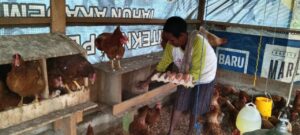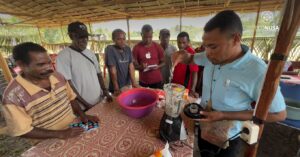
West Papua Province is currently drafting West Papua Special Provincial Regulation (Perdasus) on “Land-based Investment Protocol in West Papua Province” or so-called Ranperdasus on Investment Protocol (known as Ranperdasus PI). The Provincial Government of West Papua initially held a public consultation on August 24, 2020, on that Ranperdasus.
Prior to developing the Ranperdasus PI, the regional government has developed several drafts of Perdasus. One of the major Perdasus is the one on sustainable development in West Papua Province. In this Perdasus draft, the government highlights the purpose of development in West Papua Province, which is to create prosperity and welfare to the Indigenous Community (MHA). In addition, it is also highlighted that investment(s) should be environmentally-minded and is conducted for the environmentconservation in West Papua.
Commitments to be a Sustainable Province and the imposition of Sustainable Development principle as mandated by the Manokwari Declaration should be the basis of collective logic. The major principle of development which prioritizes the interests and welfare of the Indigenous Papuans (OAP) should be the main reference and basis for every policy and regulation making in the future.
Concerning with the issue, there are some points from Ranperdasus PI to be highlighted.
First, role and benefit of Ranperdasus PI to the Indigenous People (MHA)
It is mentioned that Ranperdasus PI aims to ensure that investment will give benefit to OAP livelihood while upholding the norms of Papuan customary practices. However, when thoroughly observed, Ranperdasus PI emphasizes on the rights for property and rights for job as the forms of protection and recognition of customary rights.
These emphases are not in line with the ultimate vission of Sustainable Development since Ranperdasus PI only gives more emphasis on the role of MHA as workers or supporters of investment, instead of MHA positioned as the ultimate beneficiaries. In addition, this Ranperdasus PI does not tackle the issue of MHA capacity building. Whereas, the MHA’s interests and welfare, particularly the OAP, should be the top priority as beneficiaries of the development.
Second, environmental and biodiversity protection
Protection of environment and biodiversity described in the Ranperdasus PI is still in general sense with less emphasis on the significance of environmental and biodiversity protection throughout West Papua. This Ranperdasus lacks stern measure to protect High Conservation Value (HCV) and to ban land clearance. Using the perspective of the specialty of West Papua Province and lex specialis derogate legi generali principle (a principle of special nature of law that overlooks the law with general sense), the provincial government here should have more space to tighten the protocol and regulation by giving more emphasis to protection of environment and biodiversity in Tanah Papua.
Third, strictness in Ranperdasus PI
The language applied in this Ranperdasus is deemed more to be seen as suggestions, as seen in its Academic Paper. The suggestive language could potentially become the loophole and advantageous points for a corporation to exploit natural richness of Tanah Papua. Suggestive language will not carry any stern sanction which could imposed on condition of incompliance with the recommendation.
Fourth, special nature of Ranperdasus PI
The major principles of investment contained in this Ranperdasus PI have actually been contained in the former draft of Perdasus on Sustainable Development. Regulating similar issue with the same hierarchy could bring about legal uncertainty. In spite of regulating the same issue, it would be better if Ranperdasus PI is changed its status into Regional Regulation and shift its nature more into obligating and regulating, instead of suggesting.
Regulation on the utilization of natural resources in Tanah Papua which sided more to financial economy and the labors reminds us on the current controversial draft of Law, draft Omnibus Law on Job Creation. Should these two regulations, Omnibus Law on Job Creation and Ranperdasus PI, are deliberated, the current efforts to prioritize MHA as the ultimate beneficiaries of all development processes in Tanah Papua will not be achieved.
In this respect, MHA will keep getting pressured and will not be positioned as the major actor. On the contrary, investors’ interests will be put as the top priority without strict compulsory obligations. The richness of Tanah Papua’s natural resources will be threatened by investors’ massive and large-scale exploitations. Ironically, MHA could only be a ‘guest’ on their own homeland as they will serve as workers.
In conclusion, the government of West Papua Province has declared its commitment as the Sustainable Province as stated in the Manokwari Declaration. However, this commitment needs sets of laws and regulations to be used as the legal basis for the government’s actions. The spirit of Sustainable Development and Vision of 2100 “Happiness and quality of all Papuan peoples are on the ultimate priority in equal and just manner, while ensuring the conservation of the Papuan nature, land, water, air conditions while improving their quality” should be compulsorily inserted in every laws and regulations in Tanah Papua, including the regulation on investment protocol.
Writer: Cindy J Simangunsong, Policy and Advocacy Manager of EcoNusa Foundation
Editor: Leo Wahyudi S & V. Arnila Wulandani







